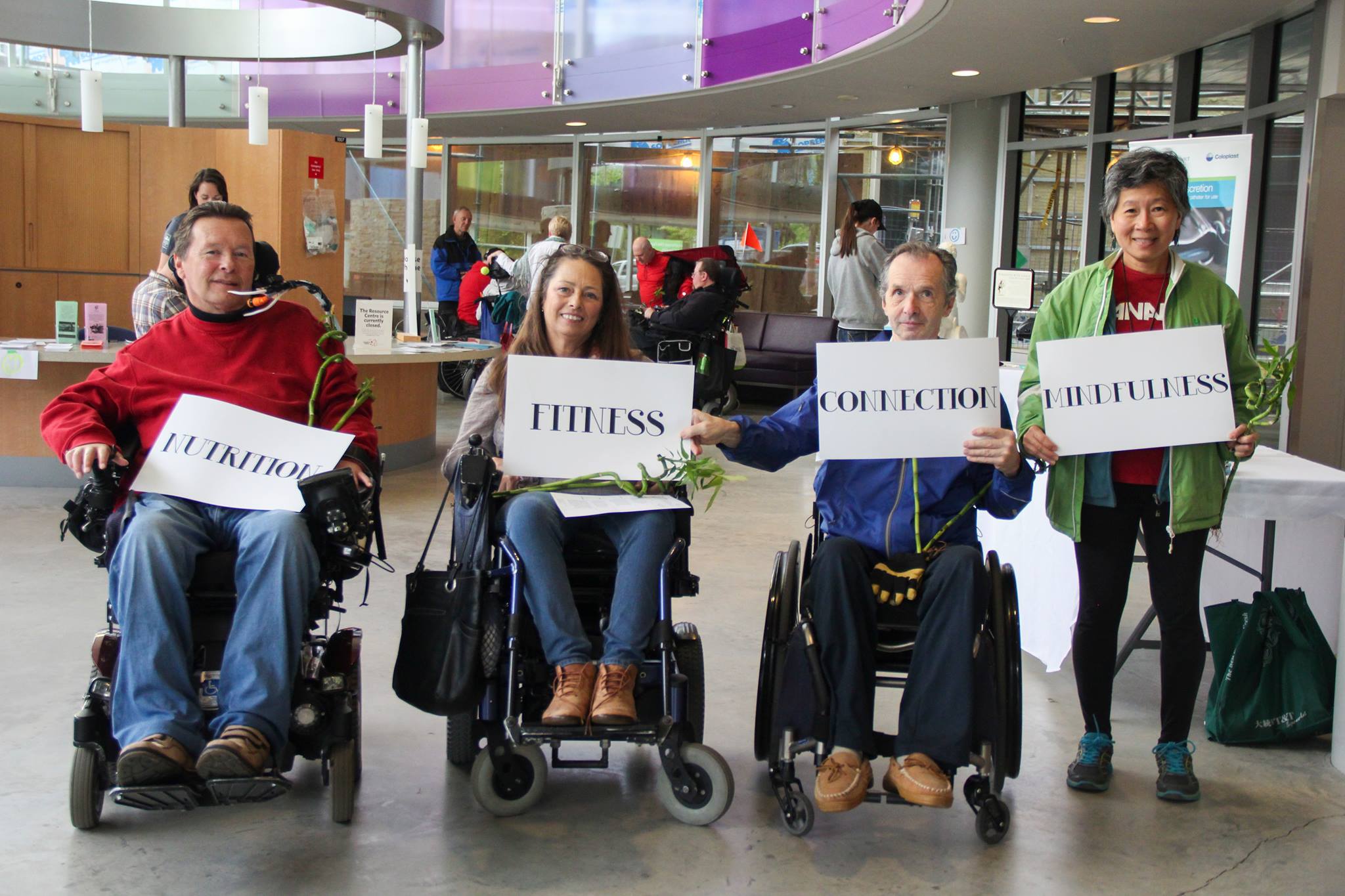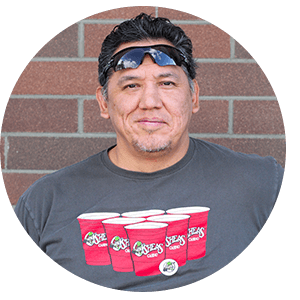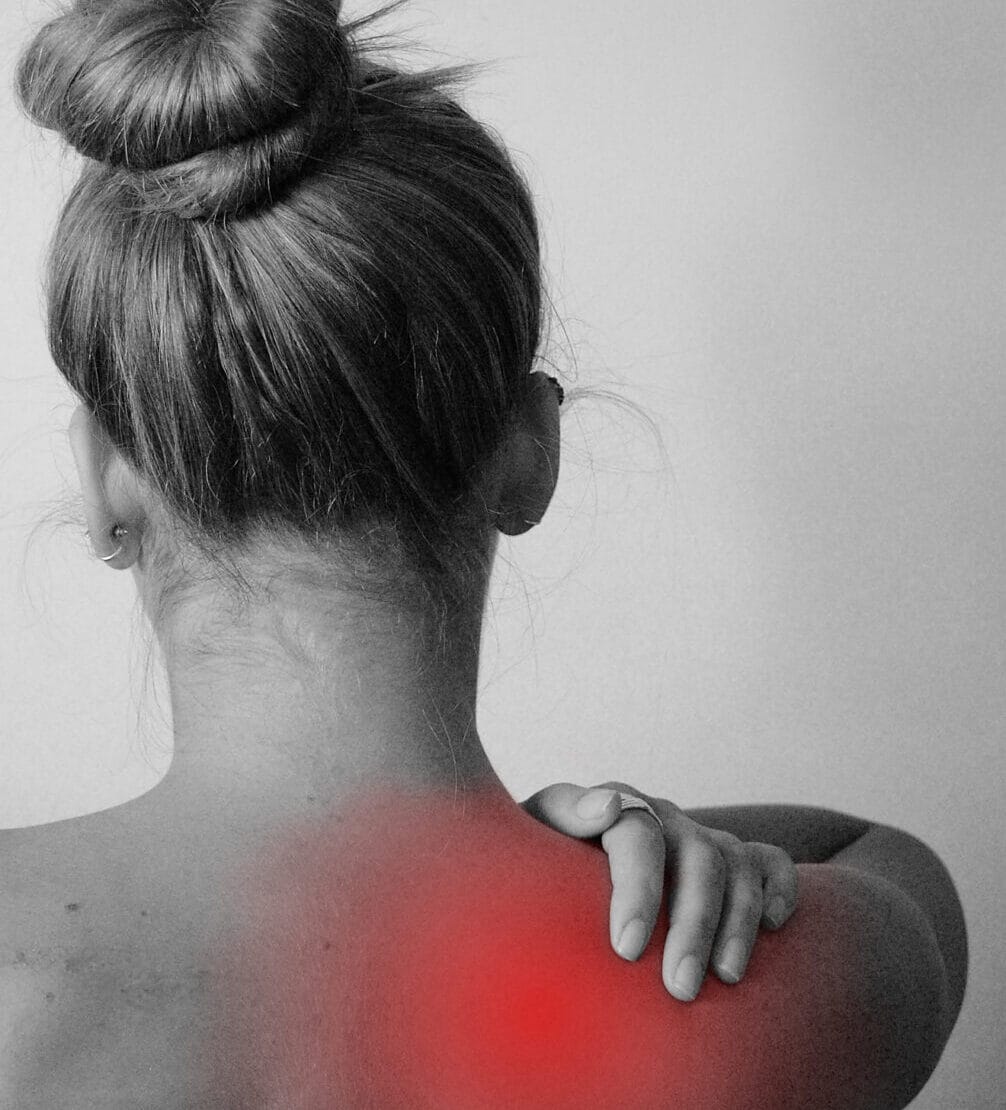
Mental wellbeing is key to living a happy and health life. But it becomes increasingly important for those of us living with a spinal cord injury.On April 16, 2016, Spinal Cord Injury BC’s annual SCI Health Forum put mental wellbeing front and centre. Topics ran the wellbeing gamut, from nutrition, fitness, and pain management to connection and mindfulness. Each topic was delivered by a panelist with real-life experience, with our InfoLine Specialist Heather Lamb emceeing the full-day event.
We often think of mental wellbeing as separate from physical health, but the truth is the two are deeply intertwined. Paying attention to what you eat and making small, conscious decisions to eat better, can help you improve your physical wellbeing, mood, and overall health. Connecting with other people and participating in social events can boost your morale and lessen feelings of depression and isolation.
Finding coping tactics, such as mindfulness, to deal with chronic pain can make all the difference. And staying active can get you physically fit while increasing your feelings of confidence and inclusion—and thus bettering your mental wellbeing, too! If you were unable to attend our SCI Mental Wellbeing Forum, or your need a refresher on the topics discussed at this year’s event, we’ve put together a Top 5 Takeaways from each of our 2016 speakers.
CONNECTION

Teri Thorson
FASHION DESIGNER, IMAGE CONSULTANT, FORMER MODEL AND PARALYMPIC ATHLETE, MOM
1. Looking Good to Feel Good
This speaks to so many people on a variety of levels. Living with an SCI can make it difficult to find comfortable and attractive clothing. But even if it’s something as simple as wearing a new lipstick or getting your hair done, knowing that you look good on the outside can truly impact how you feel inside. Always dress more formally than your audience. 55% of a first impression is based on looks, so go ahead wear that suit or dress!
2. Battling the Blues
Everyone will have bad days and good days (sometimes even bad weeks and good weeks), but it is learning to find happiness and enjoyment in the simplest things that can brighten the blues! Get out of the house. Call a friend you haven’t seen in a while. Forcing yourself to be around people can allow you to come out of your shell and realize that you are not alone in the world. Feeling especially down? Take yourself back to a time when you felt how you want to feel and recreate it in your mind.
3. Connecting With Yourself
Before connecting with someone connect with yourself. How are you feeling physically and emotionally? Take the time to consider how those feelings will impact your interactions with other people.
4. The Power Pose
Even when you’re not feeling confident, act like you are. Position your body like you own the room, even if you’re feeling like hiding.
5. Mime Time
When meeting with someone, maintain eye contact, listen, ask questions… and watch their body language and copy it. This can help you appear more at ease, and in time it will help to boost your confidence as well.
Bonus Tip: Do not become your partner’s caregiver first—be his or her partner first.
Asking for help does not mean that you are helpless, so don’t be afraid to ask. This will help you push yourself outside of your comfort zone—and it’s a great leeway into a better conversation.
NUTRITION

Kari McDougall
REGISTERED HOLISTIC NUTRITIONIST, SCI BC COOKING CLASS INSTRUCTOR, CO-FOUNDER OF MYNATURALBALANCE.CA
1. Healthy Digestion
Your brain and stomach are connected in more ways than you know. Having a healthy digestive tract can impact your mental wellbeing and overall brain health. Make sure to drink lots of water and fermented foods, like kefir and Kombucha, to help achieve a healthy balance!
2. Healthy Vitamins and Fats
Make sure to look for foods with vitamins C and B to protect cells and keep them healthy. These vitamins can be found in veggies like chili peppers, bell peppers, kale, and broccoli.
Unsaturated fats (fats which are liquid at room temperature) like omega-3s and coconut oil can be great for your overall health. These fats help to lower cholesterol and fight heart disease. Foods that contain unsaturated fat include nuts, avocado, oils, and fish.
3. Complex Carbohydrates
There are two types of carbs: complex and simple. Simple carbs are the ones we want to avoid as much as possible. They are found in foods like white bread and pasta and can lead to blood sugar imbalance when over-consumed. In other words: whole grain all the way!
4. Protein
Good proteins like beans, quinoa, fish, and meat play a major role in mental health and development. Proteins are responsible for our organs, muscles, nails, hair, hormones and, most importantly, our neurotransmitters. Eating small amounts of protein with every meal can help increase mental awareness!
5. Eating With Friends
For generations food has brought people together. It promotes cohesion and inclusion, which make people feel better overall.
Visit Kari’s website http://www.mynaturalbalance.ca/ for more information or check out our cooking classes!
FITNESS

Richard Peter
SCI BC PEER PROGRAM COORDINATOR, PARALYMPIC BASKETBALL CHAMPION

Duncan Campbell
DIRECTOR OF DEVELOPMENT FOR WHEELCHAIR RUGBY CANADA & CWSA, WHEELCHAIR RUGBY CO-INVENTOR, CANADIAN PARALYMPIC HALL OF FAME
1. No Limits
Those who are new to their injury may feel limited as to what that can do; however, compared to even 15 years ago, the possibilities are endless. Being in a chair does not need to stop you from participating in sports, and can be a great way to make connections and meet new people!
2. Fitness Goals
Setting a personal fitness goal can help keep your health and workout regime on track. Not all your goals need to be long term or lofty. Goals like make it to the gym once a week, find a gym buddy, or find a team sport I like can really help motivate you to get moving. Fitness is all about what feels good to you, so listen to your body and ask for help when needed. There are many resources available for wheelchair sports, and it’s all about trial and error. If you sign up and don’t like it, move on to the next!
3. Fitness as You Grow Older
As you age, fitness can play a major role in your overall health. It’s important to stay active and keep moving as much as possible to help with muscle memory and development, as well as with your mental wellbeing.
4. Mental Wellbeing and Fitness
Mental wellbeing and fitness are related in so many ways. The endorphins sent to your brain when working out or exercising release hormones that can improve mood, boost morale, and help give you energy.
5. Higher-Level Competition
Competing in a chair can allow you to achieve more and play at a higher level than you ever thought possible. The same amount of dedication, hard work, and training goes into competing while in a chair as competing as an able-bodied person.
PAIN AND PAIN MANAGEMENT

Dr. Michael Negraeff
MD, CHAIR OF THE BOARD OF DIRECTORS FOR PAIN BC, ASSOCIATE MEMBER AT ICORD
1. SCI: A Package Deal
As if your spinal cord injury wasn’t enough on its own, your body had to throw in bowel and bladder issues, sexual dysfunction, frustration, depression, anger…and on top of everything else, PAIN! Knowing you are part of a community can help this. Keeping connections with friends and family can help brighten your darker days.
2. No Cure for Pain
Often, people with SCI do not start experiencing pain until sometime after their injury. Just after they’ve learned to cope with a multitude of other side effects, along comes pain. There is not a specific cause or cure for the pain felt by SCI patients.
3. Tools to Deal With Pain
With the lack of a pain cure, other coping tools are vital. This could include lifestyle changes, coping mechanisms such as mindfulness, or anything else that you have found that works for you. Whatever helps get you through your pain does not need to work for everyone else—it just needs to work for you!
4. Talking to Someone
It’s always hard finding someone who understands how you are feeling, so reach out to a peer with SCI or similar pain, or look into talking to a therapist or psychiatrist. Sometimes just knowing that you are being heard can be a huge relief and help you not to feel so isolated.
5. Available Resources
Pain BC offers a number of resources to those who are suffering with chronic pain. Live Plan Be is a great resource and allows you to sign up for instructive sessions and information about creating a “Pain Plan”. The Pain BC ToolBox is another useful resource.
MINDFULNESS

Jaisa Sulit
OCCUPATIONAL THERAPIST, MINDFULNESS TEACHER AT WALLIS FOR WELLNESS
*Mindfulness is a state of active, open attention on the present, observing your thoughts and feelings from a distance without judgment.
1. Focusing on Your Breath
People lead busy lives. There always seem to be a million things floating around in our minds at any given moment, which is perfectly normal. This, however, does make it very difficult to focus what is happening right this second. If you are struggling to focus on the present, try focusing on your breath. Listening to yourself breathe for a few minutes can help calm you down—unintentionally, you’ll find yourself focusing on the now.
2. What Makes Mindfulness, Mindfulness
Your attitude is at the heart of what makes mindfulness, mindfulness. Mindfulness can be many different things, like not passing judgment, acceptance, letting go, patience, and trust. It is not particularly what you are doing…but HOW you are doing it. The intention to pay attention to the present through awareness is what mindfulness is all about.
3. Paying Attention to Your Body
When practicing mindfulness, listen to your body, thoughts, and emotions. Everything you are feeling is normal—you are allowed to feel. Make sure you pay attention to these feelings and how they change over time.
4. Mindfulness: Not Just Spirituality
Mindfulness is not just a spiritual practice. It can also be used in a secular way. There is plenty of research to support its benefits for physiological and mental health, hence the growth of its applications beyond healthcare to corporate business, education, sports, and politics.
5. Why Mindfulness Helps
Mindfulness helps us to be grounded in the present, broadens our perspectives, increases self-awareness, and gets us out of autopilot reactivity. Thus, it strengthens our ability to consciously respond to life in ways that are more effective and healthy for ourselves and others. Mindfulness can help with stress, anxiety, depression, grief and loss, anger associated with chronic pain, spasticity, fatigue and limitations to daily functioning.



